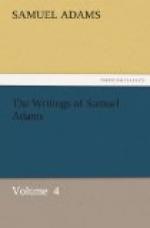You may wonder, my Dear, that I send this Budget of Politicks to you. I see no Reason why a Man may not communicate his political opinions to his Wife, if he pleases. But to tell you the truth I consider this Epistle, after the License I have already given you, as indirectly addressd to the Friend I have mentiond. I would gladly know his opinion, Whether there is not more Parade among our Gentry than is consistent with sober republican Principles. Is it to imitate the Vanity of former times that every order of Men have been so fond of addressing the Governor? Are we to pay the same Ceremonies to the next & the next? Will not such high Strains of Panegyrick injure the Feelings of modest Men? And if there should happen to be a weak Man, will they not make him intollerably vain? Republicks should adopt the Rule of another Society. The Yea should be Yea, and the Nay, Nay, for whatsoever is more than these cometh of Evil. Adieu.
1 William Cooper.
TO MRS. ADAMS.
[Ms., Samuel Adams Papers, Lenox Library.]
Philadelphia Mar. 15 1781
MY DEAR BETSY
Mr Bagnal, the Bearer of this Letter, this Moment informs me, that he sets off in half an hour for Boston I am sorry he did not give me more timely Notice, because I chuse to write to my Confidential Friends by private Hands rather than the Post. I have in a Letter forwarded yesterday, given Notice to the General Assembly, of my Wish to return home as early as may be and requested to be relievd by one of my Colleagues or otherwise as may be thought proper. I expect to have General Wards Servant to attend me on my Journey. He is afterwards to return here. I am much concernd at the Dissentions in the New South Society, who have generally been remarkeable for Peace & Harmony. They should strive for a conciliatory Spirit as far as is consistent with good Conscience, condescend to each other in smaller Matters, and bear with each others Tempers. I have not been unmindful of my Sons Situation, as mentiond in his Letter to me some time ago. He will see by the Journals of Congress (Sept. 30, 1780) that the officers in the




